Gongjinhui & Wenxueshe
The Literature Society and Gong Jin Hui were revolutionary organizations that had arisen among China's new class of intellectuals. Realizing that the New Army had the potential strength to launch the revolution, these two revolutionary organizations worked persistently to recruit the soldiers in local New Army units to the revolution's cause. In March, New Army units in Wuhan established local branches of the Literature Society. Gong Jin Hui focused mainly on recruiting soldiers in 32nd New Army. By the time Wuchang Uprising began, more than 5,000 soldiers had joined these two organizations—one third of all the troops in the local army units.
Railway Protection Moves
On May 9, 1911 the Qing Government implemented several policies regarding nationalization of the railroads. The government also announced its plan to nationalize the Yuehan Railway and Chunhan Railway, which had been built with private funds. This proposal angered the people of Hubei, Hunan, Sichuan, and Guangdong. To protect the railroads from seizure, they launched a movement, which was particularly active in Sichuan.
Further Development
On June 17, civilian organizations in Sichuan established the "Sichuan Railroad Protection Society" and elected the head of the local assembly, Pu Dianjun, as the president of the Society, and his assistant, Ro Run, as the vice president. These two men had notices posted, made speeches at various locales, and even went to Beijing to protest. From August 5 to September, these civilians held several demonstrations and strikes. On September 7, the Qing Governor of Sichuan Zhao Erfeng arrested the leader of the Railroad Protection Society, and shut down the corporation and the Society. The result of this move was a large demonstration at the Governor's office. Governor Zhao ordered soldiers to quell the protest; as a result, 30 civilians were killed. On September 8, the members of the Society along with the local Ge Lao Hui and Tongmenghui organized an uprising and besieged the provincial capital.
The nearby counties followed the uprising soon after, and the total number of participants grew to 200,000. On September 25, Wu Yuzhang, Wang Tianjie, and other members of Tongmenghui led another successful uprising in Rong county. Upon realizing that Chengdu was besieged as a result of the mass uprising, the Qing Government became alarmed and immediately ordered Duan Fang to suppress the uprising in the province of Sichuan using New Army units that were stationed in the province of Hubei.
Sun Wu, President of Gongjinhui Jiang Yiwu, President of the Literary Society


When Duan Fang led Hubei's New Army units into Sichuan in order to suppress the uprisings of the Railroad Movement, Wuhan, the capital city of Hubei province, was left virtually defenseless. The revolutionaries decided that this was the perfect opportunity for an uprising.
The troops remaining in Wuhan could be relied upon to be sympathetic to the revolution: The New Army units of Hubei had originally been the "Hubei Army," which had been trained by Zhang Zhidong. Many of the officers had received military training in Japan. While in Japan, Chinese revolutionaries residing in Japan had sought to recruit these officers to the revolution's cause.
On September 24, the Literature Society and Gong Jin Hui convened a conference in Wuchang along with 60 representatives from local New Army units. During the conference, they established a headquarters for the uprising. The leaders of the two organizations, Jiang Yiwu and Sun Wu, were elected as the commander and the chief of staff. Liu Gong of the Gong Jin Hui was in charge of the department of political preparations. The command post was set in Wuchuang, whereas the preparation post was set in Hankou. Initially the date of the uprising was to be October 6, 1911. It was later postponed to October 16 due to insufficient preparations
On October 9, Sun Wu of the Gong Jin Hui had an accident while producing explosives in the Russian Concession of Hankou. Sun Wu was injured, and the Russian police came to investigate. Sun Wu and others managed to escape, but the documents and banners for the uprising were taken away by the police along with several suspects. After being informed about this incident, the Qing Viceroy of Huguang Duan Zheng ordered a curfew to be imposed on the entire city, so that the police could track down and arrest the revolutionaries. As a result, Jiang Yiwu of the Literature Society decided to launch the uprising that very night. He dispatched messages to each of the local battalions of the New Army; however, the command post was discovered by the Qing Government and several members were arrested and executed on the morning of October 10.
How it started
Squad leader Xiong Bingkun and others decided not to delay the uprising any longer. Company commander Wu Zhaolin acted as the Provisional chief commander of the uprising while Xiong acted as the staff officer. Around 8 p.m. on October 10, the first shot was fired in Wuchang, a borough of the city of Wuhan. The Wuchang Uprising, had begun. The sapper battalion of the local New Army led the first wave, capturing the armory in Chuwantai. (Other New Army units that sympathized with the revolutionaries' cause condoned these actions later.) Wu Zhaolin and Xiong Binkun led the rebels and attacked the viceroy's office, and with the assistance of the South Lake Artillery, the revolutionaries captured the office before the morning of the next day. The Qing Viceroy of Huguang, Duan Zheng, escaped.
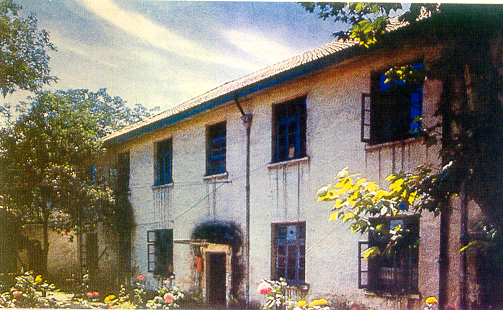
The old site of the No. 8 Engineering Battalion of the New Army. Xiong Binkun, fired the first shot here of the Wuchang Uprising
Formation of a Military Government
During the morning of October 11, the revolutionaries gathered for a conference to discuss the establishment of a military government, as well as the selection of a provincial governor. The conference chose Li Yuanhong as the governor, a choice that the constitutionists strongly supported. Part of the revolutionaries consented to this choice because the candidates whom they favored—Huang Xing, Song Jiaoren, and other important leaders—were absent.

The old site of the Military Government
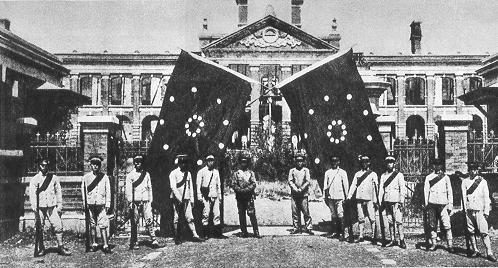
The Formation of the Military Government in Oct. 1911
The Flag
Flag of the iron blood and eighteen stars used by the uprisers
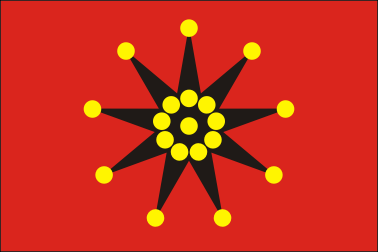
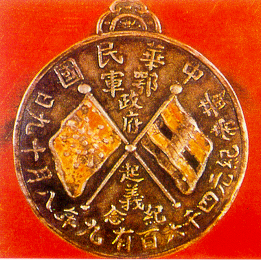
Memorial Pin of the Uprising produced by the Hubei Military Government
More about the Military Government
The entire city of Wuchang was captured by the revolutionaries by the morning of October 11. In the evening that day, they established a tactical headquarters and announced the establishment of the "Military Government of Hubei of Republic of China." They also announced a new name for the nation, the "Republic of China"; they abolished the Qing emperor's title; and they adopted the old-style calendar of the Huangdi Era, according to which the year was 4609. The Military Government established tactical, military, political and foreign affairs departments. They used the Qing Government's Politic Department as their office building, and used the Banner of 18 stars as their military flag. The Tactics department broadcast to the entire nation the "The Telegram of the Announcement to the Nation," "Notices to All Provinces," and other documents under the name of the Military Government.
Echo from the provinces
After the successful Wuchang Uprising, the Qing Government sent the Beiyang Army south to assault Hankou, reinstating Yuan Shikai to stabilize the Beiyang Army, since Yuan was the head of the Beiyang system. The revolutionaries lost the battle of Hankou: around ten thousand were killed over forty-nine days of fighting. However, the rebels held on to the city of Wuchang, and because of this, fifteen provinces announced their independence during these seven weeks. In most of these provinces local political activists led the uprisings; in only a few places did the revolutionaries lead the uprisings.
On October 22, 1911 two members named Jiao Dafeng and Chen Zuoxin of the Hunan Gong Jin Hui led an armed group consisting partly of party members and partly of New Army units in a campaign to extend the uprising into Changsha. They captured the city and killed the Qing general in the city. Then they announced the establishment of Hunan Military Government of the Republic of China, and announced their opposition to the Qing Government. On the same day, a member of Shaaxi's Tongmenghui, Jing Meijiu, as well as Jing Wumu and others including Ge Lao Hui, launched an uprising and captured Xi'an after two days of struggle. They established the Qinlong Fuhan Military Government, and elected as the military governor Zhang Fengxiang, a member of the Yuanrizhi Society and an officer in the New Army.
On October 23, Lin Sen, Jiang Qun, Cai Hui, and other members of the Tongmenghui in the province of Jiangxi plotted a revolt of New Army units in Jiujiang. After they achieved victory, they announced their independence. The Jiujiang Military Government was established the next day, electing Ma Yubao of the New Army as the military governor.
On October 29, Yan Xishan of the New Army along with Yao Yijie, Huang Guoliang, Wen Shouquan, Zhao Daiwen, Nan Guixin, and Qiao Xi led an uprising in Taiyuan, the capital city of the province of Shanxi. They managed to kill the Qing Governor of Shanxi, Lu Zhongqi, and announced the establishment of Shanxi Military Government with Yan Xishan as the military governor.
On October 30, Li Genyuan of the Tongmenghui in Yunnan province joined with Cai E, Ruo Peijing, Tang Jiyao, and other officers of the New Army, and launched an armed rebellion. They captured Kunming the next day, and established the Yunnan Military Government, electing Cai E as the military governor.
On October 31, the Nanchang branch of the Tongmenghui led New Army units in a local uprising and succeeded. They established the Jiangxi Military Government and elected Li Liejun as the military governor.
On November 3, Shanghai's Tongmenghui, Guang Fu Hui, and merchants led by Chen Qimei, Li Pingsu, Li Xie, and Song Jiaoren organized an armed rebellion in Shanghai. They recruited various squads, and received the support of local police officers. The rebels captured the Jiangnan Workshop on the 4th, and captured Shanghai soon after. On November 8, they established the Shanghai Military Government of the Republic of China, and elected Chen Qimei as the military governor.
On November 4, Zhang Bailin of the revolutionary party in Guizhou led an uprising along with New Army units and students from the military academy. They immediately captured Guiyang and established the Dahan Guizhou Military Government, electing Yang Jinchen and Zhao Dequan as the chief and vice governor. During the same day, the revolutionaries in Zhejiang urged the New Army units in Hanzhou to launch an uprising. Reinforcements arrived from Shanghai and laid siege to Hanzhou. Zhu Rei, Wu Enyu, Lu Gongwang of the New Army, and Wang Jinfa of the dare-to-die squads captured the military supplies workshop. Other dare-to-die squads led by Chiang Kai-shek and Yin Zhirei along with others captured most of the government offices. On November 5, Hanzhou was in the control of the revolutionaries, and the constitutionist Tang Shouqian was elected as the military governor.
On November 5, Jiangsu constitutionists and gentry urged the Qing Governor Cheng De to announce independence, and established the Jiangsu Revolutionary Military Government with Cheng himself as the governor. Members of Anhui's Tongmenghui also launched the uprising on that day, and laid siege on the provincial capital. The constitutionists persuaded Zhu Jiabao, the Qing Governor of Anhui, to announce independence. On November 8, the Anhui politics department presented Anhui's independence to the public, and Zhu Jiabao and Wang Tianpei were elected the chief and vice military governor.
On November 6, the Guangxi politics department decided to secede from the Qing Government, announcing Guangxi's independence. The Qing Governnor, Shen Bingdan, was allowed to remain governor; however, he was subsequently removed by a general named Lu Rongting, who led a mutiny.
On November 9, members of Fujian's branch of the Tongmenghui along with Sun Daoren of the New Army launched an uprising against the Qing Army. The Qing viceroy, Song Shou, committed suicide, and on November 11, the entire Fujian province was in the hands of the revolutionaries. The Fujian Military Government was established, and Sun Daoren was elected as the military governor.
Near the end of October, Chen Jiongming, Deng Keng, Peng Reihai, and other members of Guangdong's Tongmenghui organized local militias to led the uprising in Huazhou, Nanhai, Sunde and Sanshui of the Guangdong province. On November 8, after being persuaded by Hu Hanmin, general Li Huai and Long Jiguang of the Guangdong Navy agreed to support the revolution. The Qing viceroy of Liang-guang was forced to discuss with the local representatives a proposal for Guangdong's independence. They decided to announce Guangdong's independence the next day. On November 9, Chen Jiongming captured Huizhou. At the same day, Guangdong announced its independence, and established a military government. They elected Hu Hanmin and Chen Jiongming as the chief and vice governor.
On November 13, persuaded by revolutionary Din Weifen and several other officers of the New Army, the Qing Governor of Shandong Sun Baoqi agreed to secede from the Qing Government and announced Shandong's independence.
On November 17, Ningxia the Tongmenghui launched the Ningsha Uprising and established the Ningsha Revolutionary Military Government on the 17th.
On November 21, Guanganzhou organized the Dahanshubei Military Government. The Xichuan Military Government was established in Chongqin the very next day. Two days on the 27th, the Hubei Army in Xichuan rebelled against the Qing Army. During the same day, the Dahan Xichuan Military Government was established, headed by revolutionary Pu Dianjun.
On November 8, plotted and supported by the Tongmenghui, Xu Shaozhen of the New Army announced an uprising in Molin Pass, 30 km away from Nanjing City. Xu Shaozhen, Chen Qimei, and other generals decided to form a united army under Xu to strike Nanjing together. On November 11, the united army headquarter was established in Zhenjiang. Between November 24 and December 1, under the command of Xu Shaozhen, the united army captured Wulongshan, Mufushan, Yuhuatai, Tianbao City, and many other strongholds of the Qing Army. On December 2, the Nanjing City was captured by the revolutionaries.
At this point, the vast areas south of the Yangtze River were held by the revolutionaries. The capture of Nanjing was especially important in stabilizing the situation in the southern China.
Provisional Government of Nanking
On 1 November, the Qing Government appointed Yuan Shikai as the prime minister of the imperial cabinet. Overseas Chinese and domestic critics believed that Yuan was qualified to be president. They suggested that the revolutionaries should persuade Yuan to leave the Qing and join the revolutionaries; he would then be selected as the first president of the republic. On 9 November, Huang Xing told Yuan it is hoped that he would resist the imperial reign. On November 16, Sun Yat-sen telegrammed the revolutionary government and informed of his agreement to select Yuan as the president.
On November 1911, the revolutionary group in Wuchang led by Li Yuanhong came together with the revolutionary group in Shanghai led by Chen Qimei and Chen Dequan to prepare for the establishment of a new central government. On November 9, Li Yuanhong under the title of "Head of Wuchang Military Government" telegrammed all the independent provinces and asked them to send representatives to a conference in Wuchang, which would establish a new central government.
Two days later, however, Chen Qimei and Chen Dequan telegrammed the provinces, asking them to send delegates to a similar conference in Shanghai. On November 15, the provincial representatives met at Shanghai, including delegates from Shanghai, Jiangsu, Zhejiang, and Fujian. The revolutionary group in Wuchang insisted on moving the conference to Wuchang. Because the first uprising was held in Wuchang, a majority of the provincial representatives had already arrived in Wuhan. Tongmenghui leaders, such as Huang Xing and Song Jiaoren, were also stationed in Wuhan. The Shanghai revolutionary group eventually yielded, agreeing that the provincial representatives should meet at Wuhan and set the conference date to be November 30 in Hankou. However, they requested that each province should leave a representative in Shanghai for communication purposes.
By November 21, most provincial representatives had arrived in Wuchang. On November 30, they convened the first conference at the British concession in Hankou. Twenty-four representatives from the fourteen provinces participated, and they elected Tan Renfeng as the speaker. The conference decided that before the establishment of the Provisional Government, the Military Government of Hubei would act as the Central Military Government's authority. On December 2, the representatives decided to frame the organizational outline of the Provisional Government, and they elected Lei Fen, Ma Junwu, and Wong Zenting to prepare the draft. The conference passed the outline the very next day, which consisted three chapters and twenty-one clauses. The outline established a Provisional Government in Nanking; it also confirmed that the new government would be a republic. It was also announced that the provincial representatives would meet in Nanking in seven days, and if Provisional Government received delegates from more than ten provinces, it would elect a president of the provisional government. All participating provincial representatives signed the document and the outline was then publicized.
Instead of attending Nanking's assembly, Song Jiaoren and Chen Qimei gathered the provincial representatives in Shanghai and held an assembly in the headquarter of Jiangsu Educational Society on December 4. The assembly voted and decided to telegram Sun Yat-sen and ask him to return to China in order to direct the main political operation. They also elected Huang Xing and Li Yuanhong as the chief and vice generalissimo of the military government. The Shanghai assembly also decided that the chief generalissimo would be in charge of the Provisional Government. Huang Xing declined the office of chief generalissimo, while Li Yuanhong refused the position of vice generalissimo—in part because he did not wish to be subordinate to Huang Xing. When the assembly proceeded to discuss the national flag, the representatives from Hubei proposed a banner of 18 stars, whereas the Fujian representatives proposed the Blue Sky with a White Sunbanner, and the Zhejiang representatives proposed for the banner of five stars. In the end, the assembly compromised: the national flag would be the banner of Five Races Under One Union, the Iron Blood banner would be the flag of the army, while the Blue Sky with a White Sun banner would be the flag of the navy.
On December 11, the representatives from seventeen provinces left Shanghai and Hankou and arrived in Nanking, where they continued to discuss the establishment of a new Central Government. On December 14, the representatives decided to elect a president, consistent with the terms of the "Provisional Government Organization Outline". However, the representatives were divided into two factions—one favoring Li Yuanhong, the other favoring Huang Xing. The situation seemed to be deadlocked. It was resolved the next day when the representatives were informed that Yuan Shikai was willing to support the republic. As a result, they decided to halt the presidential election and await Yuan's decision.
On December 25, Sun Yat-sen arrived in Shanghai from Marseilles. Due to Sun's prestige, most revolutionary organizations voiced their support for him and Sun was therefore the popular choice for the president. Even the constitutionists and conservatives believed that Sun would be the ideal choice for president—a belief they had held even before Yuan Shikai had turned against the monarchy. On December 29, the presidential election was held in Nanking. According to the first article of the "Provisional Government Organization Outline", the Provisional President was to be elected by representatives from the provinces of China; the candidate who received more than 2/3 of the votes would be elected. As for the voting, each province were limited to one vote only. 45 representatives from seventeen provinces participated in this election, and Sun Yat-sen received 16 valid votes out of 17; thus he was elected the first president of the Republic of China.
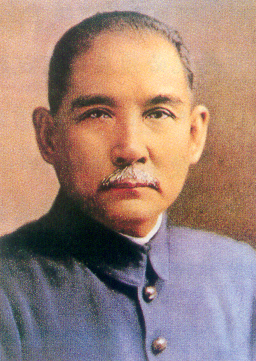
The Provisional President of the Republic of China
Sun Yat-sen
Chancery of the Provisional President
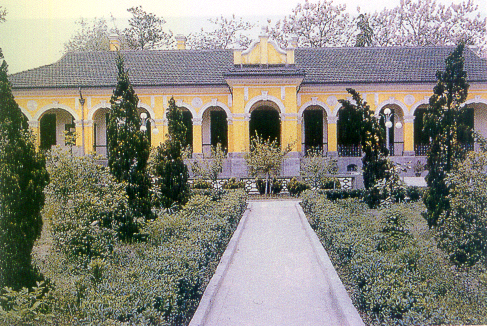
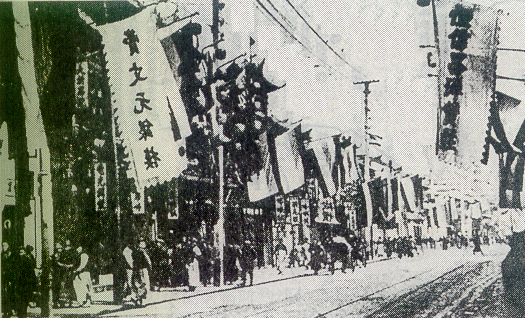
To celebrate the success of the revolution, five-color flags were hung on the Nanjing Road of Shanghai.
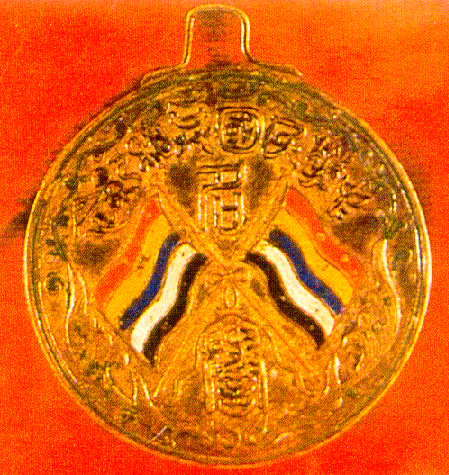
Memorial Pin of the Republic of China
A conference of the cabinets in Nanking Provisional Government
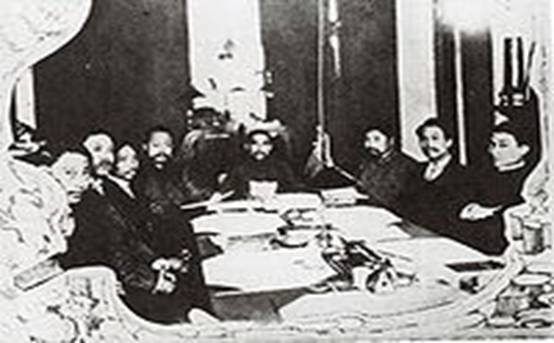
Establishment of Nanking Provisional Senate
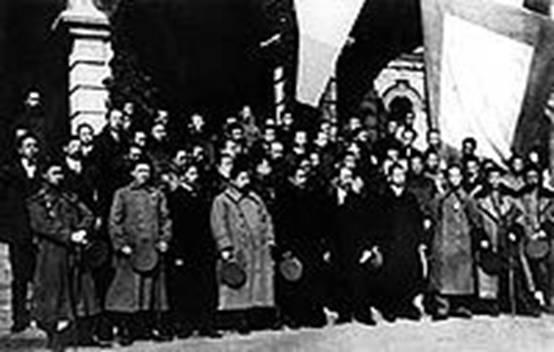
Establishment of the Provisional Government
On 1 January 1912, Sun Yat-sen announced the establishment of the Republic of China in Nanking, and he was inaugurated as the Provisional president. In the "Inaugural Announcement of Provisional President", the unity of Chinese races as one was greatly emphasized. On 2 January 1912, Sun Yat-sen informed all provinces that the Yin calendar had been abolished and that it had been replaced by the Yang calendar. The Republic of China Era was announced, and 1912 was the First Year of Republic of China Era. On January 3, the representatives recommended Li Yuanhong as the Provisional vice president, and approved the candidates whom Sun Yat-sen had proposed to serve as cabinet ministers. The Provisional Government of the Republic of China was thus officially established.
Under the Provisional Government, there were ten ministries: Huang Xing was appointed both as the Minister of the Army and as Chief of Staff, Huang Zhongying as the Minister of the Navy, Wang Chonghui as the Minister of Foreign Affairs, Wu Tingfang as the Minister of the Judiciary, Chen Jingtao as the Minister of Finance, Cheng Dequan as the Minister of Internal Affairs, Cai Yuanpei as the Minister of Education, Zhang Jian as the Minister of Commerce, and Tang Soqian as the Minister of Communications. There were additional appointments, such as Hu Hanmin as the Secretary of the President, Song Jiaoren as the Director-general of Law-making, and Huang Fushen as the Director-general of Printing.
On January 11, the representatives from the provinces convened a constitutional assembly, in which they passed a resolution to use the "Organizational Outline of the Provisional Government of the Republic of China" as the outline of the nation, Nanjing as the Provisional capital, and the five-color banner (red-yellow-blue-white-black) as the national flag to symbolize the unity of the five major races of China. On January 28, the representatives from the provinces established a Provisional senate, in which each participating province received a seat. They elected Lin Sen and Chen Taoyi as the chief and vice speaker of the senate, respectively. On March 11, 1912, Sun Yat-sen signed and announced the "Provisional Constitution of the Republic of China".
Peace negotiations between North and South
After the Wuchang Uprising, the dominant foreign powers in China remained indifferent, waiting to see which side would best meet their interests.
On 14 October, 1911 the Qing Government appointed Yuan Shikai, who had previously been dismissed and sent home, as the Governor of Huguang and put him in command of the Beiyang Army with orders to attack Wuhan. After the Beiyang Army captured Hankou on 2 November, Yuan Shikai halted the advance and secretly began to negotiate peace with the revolutionaires in the south. He returned to Beijing with his guards afterwards. Yuan was appointed the Prime Minister of the Imperial Cabinet in November, and was recognized as such by foreign nations.
On 26 November, Yuan asked Herbert Goffe, the British consul in Hankou, to announce the three conditions for peace negotiations: an armistice, abdication of the Qing Emperor, and selection of Yuan as the president. On 1 December, both sides signed the armistice pact, and the Wuhan region was under a ceasefire for three days starting at 08:00 on 3 December until 08:00 on 6 December. Peace negotiations commenced as the ceasefire came into effect on 3 December.
Tang Shaoyi, Representative of the Wu Tingfang, Representative of the South North.
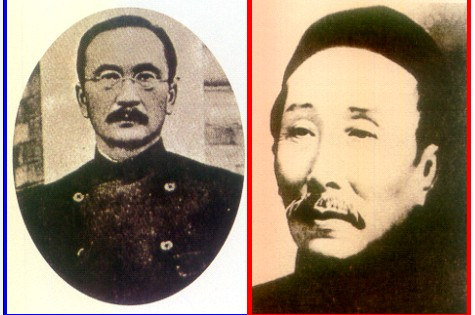
With the intervention of foreign powers, Tang Shaoyi and Wu Tingfang began to negotiate a settlement at British concession in Shanghai. They agreed that Yuan Shikai would force the Qing Emperor to abdicate in exchange for the southern provinces' support of Yuan as the president of the Republic. After considering the possibility that the new republic might be defeated in a civil war or by foreign invasion, Sun Yat-sen agreed to Yuan's proposal to unify China under Yuan Shikai's Peking government.
On 1 January 1912, the Nanking Provisional Government was formally established, and Sun Yat-sen was inducted as the Provisional president. On 2 January, after Yuan was informed that Sun Yat-sen had been inaugurated as the president, he canceled the peace negotiations. Three times—on 11, 17, and 19 January—the Nanking Government requested that the foreign powers recognize it, but received no response.
On 16 January, while returning to his residence, Yuan Shikai was ambushed in a bomb attack organized by the Tongmenghui in Tientsin, Peking. Yuan's guards suffered heavy losses although Yuan was not seriously injured. He sent a message to the revolutionaries the next day pledging his loyalty and asking them to not organize any more assassination attempts against him.
On 20 January, the Nanking Provisional Government officially delivered to Yuan Shikai the terms for the abdication of the Qing Emperor. On 22 January, Sun Yat-sen announced that if Yuan Shikai supported the emperor's abdiction, he (Sun Yat-sen) would resign the presidency in favor of Yuan Shikai. After Yuan received this promise, he sped up the process of forcing the Qing Emperor's abdiction. He threatened Empress Longyu that if the revolutionaries came to Peking, the lives of the royal family would not be spared, but if they agree to abdicate, the terms for their abdication would be honored.
On 25 January, incited by Yuan Shikai, 47 Beiyang Army generals led by Duan Qirui broadcast a telegram throughout the nation, announcing that the revolutionaries had accepted the terms for the abdication of the emperor and his family. The generals requested that the royal family announce its abdiction and let the republic assume control of the nation because the revolution had spread across all of the provinces in the country and the Beiyang Army could no longer defend the Qing government due to lack of reinforcements. Under this pressure, Qing Government convened an imperial conference on January 29 to discuss on the matter. On 3 February, Empress Longyu gave Yuan Shikai full permission to negotiate the terms for the abdiction of the Qing Emperor.
On 6 February, the senate of Nanking passed a resolution of "Perquisite Conditions" and the "Imperial Edict for Abdiction". The prequistite conditions included:
1. The Qing Emperor remains and will be treated as a foreign monarch by the Republic Government.
2. The Republic will allocate 4,000,000 Yuan each year for royal expenses.
3. The emperor will remain in the Forbidden City until he can be transferred to Yiheyuan (the Summer Palace).
4. Royal temple and tombs will be guarded and maintained.
5. The expenses of Guangxu's tomb will be disbursed by the Republic.
6. Royal employees will remain in the Forbidden City with the exception of eunuchs.
7. Private property of the royal family will be protected by the Republic.
8. Royal forces will be incorporated into the army of the Republic.
In addition to the perquisite conditions for Qing Emperor's abdication, there were seven regulations concerning the treatment of the royal family and Mongol tribes.
Abdication of the emperor
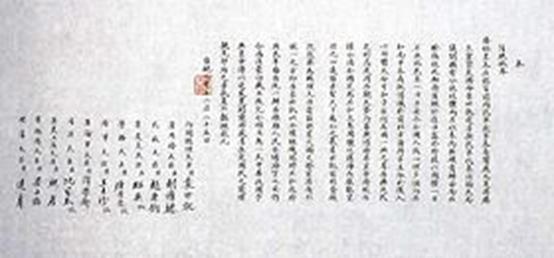
On February 12, 1912, after being persuaded and pressured by Yuan Shikai and other ministers, Emperor Xuantong Puyi and Empress Longyu accepted the terms for the Imperial family's abdication, issuing an imperial edict announcing the abdication of Xuantong. Yuan Shikai was authorized by the Qing court to arrange a provisional republican government.
This imperial edict of abdication was drafted by Zhang Jian, and was approved by the Provisional senate. But in the edict, the text "immediate authorization for Yuan Shikai to arrange Provisional republican government“ was added by the subordinates of Yuan. From this point on, the Republic of China officially began and replaced the Qing Dynasty, which had reigned over China for 268 years.
Yuan Shikai became the Provisional president
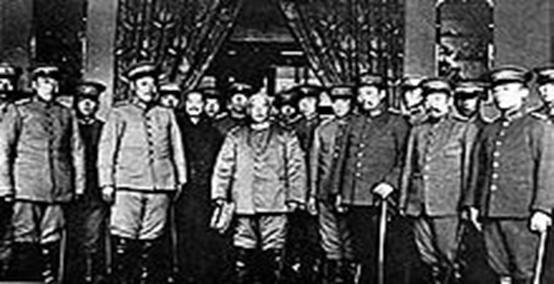
The Provisional senate selected Yuan as the Provisional president after the emperor's abdiction. On 10 March 1912, Yuan Shikai was sworn as the second Provisional president of the Republic of China in Peking. Sun Yat-sen visited the senate on April 1 and announced the removal of his Provisional president status. Now the world powers began to recognize the Republic of China. Yuan Shikai used a mutiny in Peking as an excuse to move the capital of Republic of China from Nanking back to Peking.
Yuan insisted on a centralized government which would prevent provinces from seceding. At the same time, Yuan negotiated with the world powers in order to maintain some measure of Chinese sovereignty over Mongolia and Tibet.
In February 1913, China announced the first parliamentary elections according to the Provisional constitution. The Kuomintang had the most seats, and Song Jiaoren was designated as the prime minister of the cabinet. However, Song was assassinated in Shanghai on 20 March 1913. Yuan Shikai was believed to have been behind the assassination. Sun Yat-sen launched a Second Revolution in July 1923, attacking Yuan with armed forces; but Sun Yat-sen was defeated by Yuan. Yuan Shikai later attempted to restore the monarchy, but failed. After Yuan's death, China entered the Warlord Era. Sun Yat-sen organized several governments in Guangzhou to "protect" the Provisional constitution; as a result, China was again divided between north and south.
Historical significance
The Xinhai Revolution overthrew the Manchu Government and 4000 years of monarchy. Throughout Chinese history, old dynasties had always been replaced by new dynasties. The Xinhai Revolution, however, was the first to overthrow a monarchy completely and attempt to establish a Republic. Asia had had democratic republics previously – the Lanfang Republic established in 1777, the Republic of Formosa in 1895, and the First Philippine Republic in 1899. The Xinhai Revolution established the Republic of China, the fourth democratic republic established in Asia. The laws of the democratic republic were undermined by the Beiyang warlords, and a monarchy was briefly restored. However, the republic enjoyed such broad public support that it could not be overturned.
The Chinese revolutionaries had not evolved their own form of republican government. As a result, they followed the American Constitution and the American political system, and they implemented a presidential republic. This continued despite social limitations and despite the provisional constitution's shortcomings. At one time, Sun Yat-sen modified the constitution to limit Yuan Shikai's power, while Yuan Shikai later annulled the constitution to proclaim himself emperor. During the early years of the Republic of China, democracy was not fully fledged. However, it was the first time China had attempted to form a republic, which nevertheless spread democratic ideas throughout China.
Evaluation
In the early years of Republic of China, the intellectuals in China and the participants of the Xinhai Revolution were excited by the revolution's success in overthrowing the Manchu Dynasty, and they had high hopes for the revolution. However, because democracy had been only partially realized after the Xinhai Revolution, people began to develop different perspectives. Sun Yat-sen mentioned the following in a letter to the Russian ambassador in 1921 "Now our friends recognize that my resignation was a huge political mistake". Sun also urged in his will that "The revolution is not yet successful, the comrades still need to strive for the future". The intellectuals at the time thought that a political revolution alone could not save China and that preparations had to be made for a cultural reformation.
After the 1920s, the two dominant parties—the Nationalist Party and the Communist Party—evaluated the Xinhai Revolution quite differently. The Nationalist Party recognized Sun Yat-sen as the Father of the Nation and as the leader who led the Xinhai Revolution to success. They had a high opinion of the Xinhai Revolution, viewing the Xinhai Revolution as the starting point of the modern history of China, and as the key element that enabled China to develop into a democratic and modern nation.
On the other hand, the Communist Party thought that the Xinhai Revolution merely overthrew the totalitarian rule of the Qing Dynasty. It did not oppose imperialism or feudalism because the bourgeois class was (allegedly) compromising and feeble, and therefore it did not create a truly republican system. Land had not been redistributed equally, and a transformation of society had not been achieved. The revolution ended up yielding to the Western powers, and it compromised with Yuan Shikai, who represented the old regime. At the same time however, they recognized that, if viewed as a first stage of reform, the Xinhai Revolution had achieved much and had set the stage for further revolutions.
Liu Shaoqi was quoted as saying that the "Xinhai Revolution inserted the concept of a republic into common people". Zhou Enlai pointed out that "Xinhai Revolution overthrew the Qing rule, ended 2000 years of monarchy, and liberated the mind of people to a great extent, and opened up the path for the development of future reovlution. This is a great victory". He Xiangning thought that "Xinhai Revolution was a great victory: it destroyed 2000 years of monarchy, and spread the seed of the thoughts of a republic among the people, and promoted new development for the revolutionary struggle of the Chinese people". Later Marxist historians mainly recognized the Xinhai Revolution as the Chinese bourgeois revolution, which is a necessary stage of revolution preceding a socialist revolution. These positive views of the Xinhai Revolution were common in Mainland China and Taiwan after the 1950s.
A change in the belief that the revolution had been a generally positive change began in late 1980s and 1990s. Zhang Shizhao was quoted as arguing that "When talking about the Xinhai Revolution, the theorist these days tends to overemphasize. The word ‘success’ was way overused". Chinese historians such as Li Zehou, Liu Zhaifu, and others thought that in the early 20th century, China would have been better off if it had pursued a gradual constitutional reform of the monarchy instead of engaging in a violent revolution. The former policy was said be better because it would have ensured China's steady development.
The concept of constitutional monarchy advocated by Yuan Shikai, Kang Youwei, Liang Qichao, and Yang Du was more suitable for China at that time. The Taiwanese historians also began to re-examine some of the alleged "myths" of Xinhai Revolution, and began to re-evaluate the value of Xinhai Revolution and its effects.
Western scholars, Chinese specialists, and historians have researched the Xinhai Revolution to a great extent. Famous Chinese specialist John Fairbank characterized the Xinhai Revolution as merely a "change of political system", which was "essentially a failure". Gao Muke thought that Xinhai Revolution was a revolution that was greater than all its leaders, and was a "revolution without a real leader".
Professor Nathaniel Peffer of the Columbia University criticized the Xinhai Revolution and its attempt to establish a republic:
The replica of the American system of republic built by China in 1911 was absurd and ridiculous. [...] That system of republic was a major failure, because it had no basis in Chinese history, tradition, politics, system, nature, beliefs or habits. It was a foreign product, hollow, and was forcibly added on China. It was quickly removed as the time passed. It did not represent political thoughts, but caricatures of political thoughts, coarse and premature caricatures. This system of republic ended miserably, which meant it failed miserably. However, the failure was not the system of the republic it was a whole generation.
